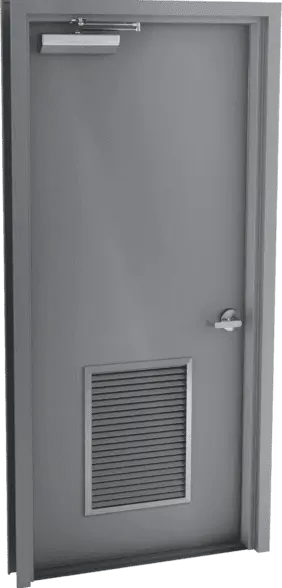In the ever-evolving world of commercial building design and construction, the significance of proper ventilation and energy efficiency cannot be overstated. Among the many components that contribute to these crucial aspects, louvers play a pivotal role in facilitating airflow and maintaining a comfortable indoor environment. Selecting the right louver size boosts efficiency and productivity. Learn about airflow and energy efficiency in our blog.
Understanding the Basics of Louvers
Before delving into the importance of louver size, let's take a moment to understand what louvers are and how they function. Louvers are horizontal or vertical slats installed on doors, walls, or windows, designed to permit the flow of air while blocking rain, direct sunlight, or debris from entering the building. They come in various materials, such as aluminum, steel, or wood, each with its unique benefits and purposes.
Importance of Proper Ventilation
Adequate ventilation is crucial for any commercial space. It ensures a continuous supply of fresh air, removes indoor pollutants, and helps control temperature and humidity levels. Proper ventilation not only enhances the indoor air quality but also impacts the health and well-being of occupants, contributing to increased productivity and reduced sick days.
How Louver Size Affects Airflow
The size of louvers directly impacts the amount of airflow that can pass through them. Larger louvers allow more air to flow into the building, facilitating better ventilation. However, it's essential to strike a balance, as overly large louvers might compromise the door's structural integrity or lead to excessive energy loss.
Factors to Consider When Choosing Louver Size
- Building Regulations and Standards: Before selecting a louver size, it is essential to familiarize yourself with local building codes and regulations. Some areas have specific requirements for minimum ventilation rates, which must be adhered to for safety and compliance.
- Space Function and Occupancy: The purpose of the commercial space and the number of people occupying it are crucial factors to consider. High-occupancy areas, such as conference rooms or retail spaces, may require larger louvers to accommodate higher airflow demands.
- Environmental Factors: The geographical location of your building plays a significant role in determining the ideal louver size. Areas with extreme weather conditions, such as hot summers or cold winters, may require larger louvers to facilitate efficient heating, ventilation, and air conditioning (HVAC) systems.
- Building Orientation: The direction in which your commercial building faces can impact the amount of sunlight it receives throughout the day. Properly sized louvers can help regulate solar heat gain, reducing the need for artificial cooling and optimizing energy consumption.
Benefits of Choosing the Right Louver Size
- Improved Indoor Air Quality (IAQ): Properly sized louvers enable a steady flow of fresh air, reducing the buildup of pollutants, allergens, and odors. This creates a healthier indoor environment, enhancing the well-being and comfort of occupants.
- Energy Efficiency: By selecting the appropriate louver size, you can enhance the energy efficiency of your commercial space. Well-ventilated areas require less reliance on mechanical HVAC systems, leading to reduced energy consumption and lower utility costs.
- Enhanced Comfort: Adequate ventilation ensures a more comfortable indoor environment, maintaining optimal temperature and humidity levels throughout the year. This creates a pleasant workspace that can boost employee morale and productivity.
- Sustainability and Green Building Practices: Choose the correct louver size for sustainability, reducing carbon footprint and supporting environmental efforts. Energy-efficient ventilation can earn LEED certifications, showing commitment to sustainability.
- Long-Term Cost Savings: Invest in the right louver size for long-term cost savings. It lowers energy use and maintenance expenses.
Key Considerations
Selecting the correct louver size impacts ventilation, energy efficiency, and workspace comfort. Good ventilation boosts air quality, health, productivity, and satisfaction.
Consider regulations, function, environment, and orientation for informed decisions aligning with business goals. Choosing the right louver size boosts ventilation, sustainability, savings, and environmental impact.
Invest in quality louvers for better ventilation system performance and longevity. Aim for energy efficiency to set responsible building practices.
Reach out to CDF Distributors today for any inquiries or to place orders for commercial doors and accessories!
